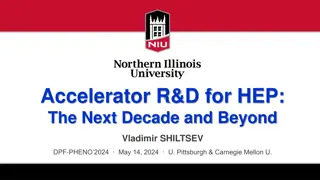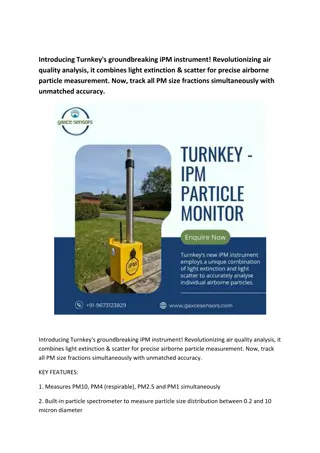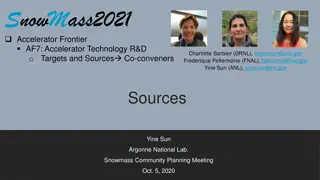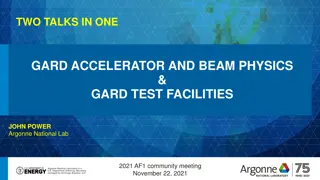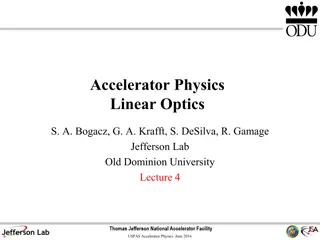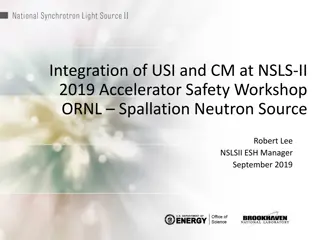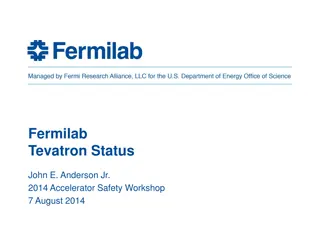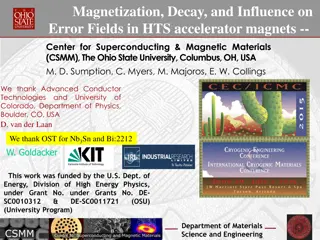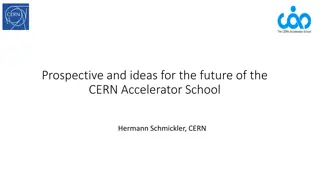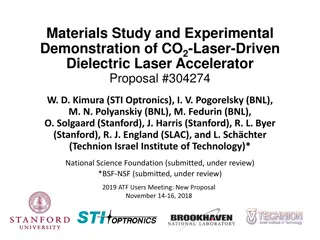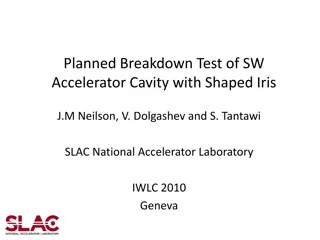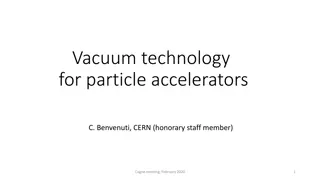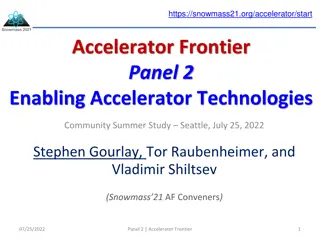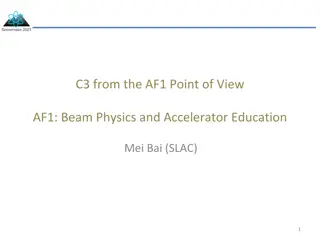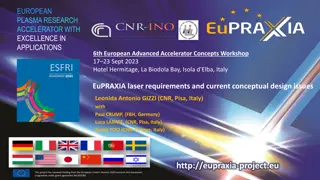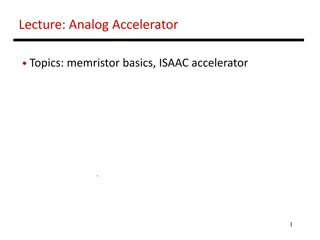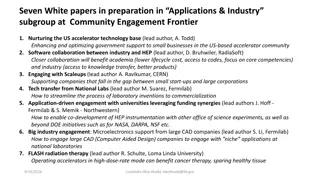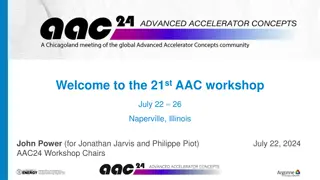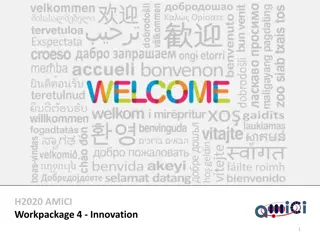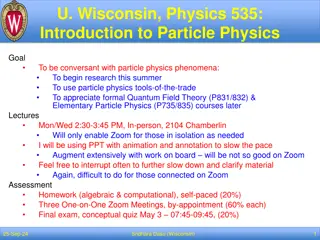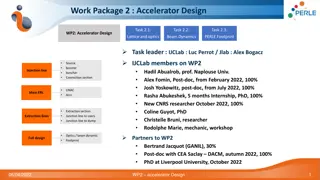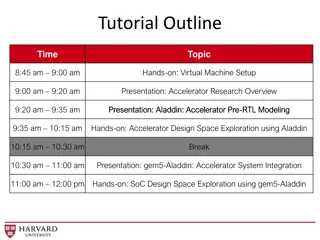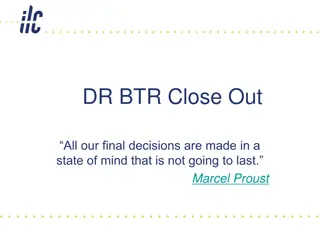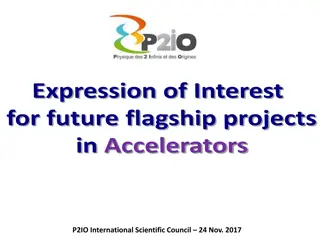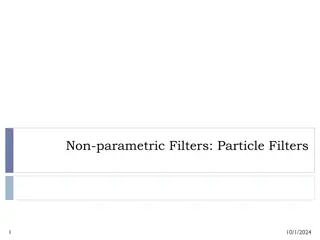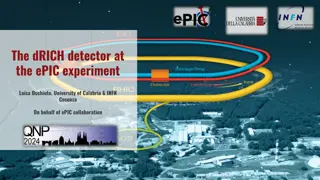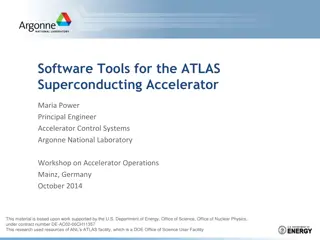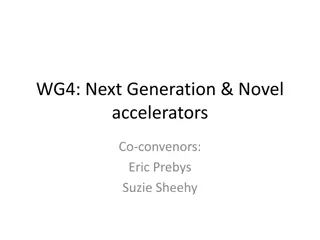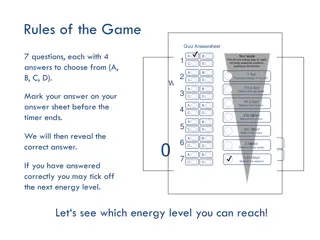Building a FAIR-Compliant Platform for AI-Ready Data in Particle Accelerators
This content discusses the development of a FAIR-compliant platform for AI-ready data in particle accelerators, highlighting the applications of machine learning in various accelerator facilities like CERN, PETRA-III, NSLS-II, HEPS, and more. It emphasizes the importance of high-quality data in acce
2 views • 25 slides
Current Trends in High Energy Accelerator Developments
Explore the latest trends in high energy accelerator development as discussed by experts from various institutes around the world, including proposals from China and existing accelerator projects. Learn about the classification of accelerator facilities based on size and the ongoing evolution of fut
0 views • 36 slides
European Particle Physics Strategy Update & Accelerator R&D Overview
European Particle Physics Strategy updates serve as the cornerstone for long-term decision-making in the field, with a focus on Accelerator R&D for High Energy Physics. The update process involves key questions, R&D strategies for RF technologies, and implementation plans. Approved strategies emphas
7 views • 25 slides
Accelerator R&D for High-Energy Physics: Advancements and Future Prospects
Vladimir Shiltsev's presentation at DPF-PHENO 2024 discusses the evolution of accelerator R&D in high-energy physics, emphasizing the need for off-shore Higgs factories and targeted collider developments. The P5 recommendations underscore the importance of engaging in feasibility studies for advance
0 views • 28 slides
Introducing Turnkey's groundbreaking iPM instrument
\nIntroducing Turnkey's groundbreaking iPM instrument! Revolutionizing air quality analysis, it combines light extinction & scatter for precise airborne particle measurement. Now, track all PM size fractions simultaneously with unmatched accuracy. \nKEY FEATURES:\n1. Measures PM10, PM4 (respirable),
1 views • 2 slides
Understanding Comminution and Particle Size Reduction in Pharmaceutical Processes
Comminution is the process of reducing particle size from larger to smaller particles, crucial in various industries like pharmaceuticals. This operation involves milling, grinding, and size reduction to make raw materials usable. The particle size plays a significant role in pharmaceutical formulat
2 views • 50 slides
Sustainable Accelerators Workshop by ASTeC at STFC Daresbury Laboratory
ASTeC at STFC Daresbury Laboratory is hosting a workshop on improving the sustainability of particle accelerators, aiming to bring together scientists, engineers, and stakeholders to enhance current and future accelerator sustainability. The agenda includes discussions on reducing emissions, green t
0 views • 5 slides
Government Contractors Basics for Beginners with OK APEX Accelerator
Explore the essentials of government contracting for beginners, including details about OK APEX Accelerator (formerly PTAC), the services offered, NAICS codes, SAM registration, and more. Learn how APEX Accelerator assists businesses in participating in government contracts, offering counseling, ass
0 views • 20 slides
Accelerator Technology R&D Targets and Sources Overview
The SnowMass2021 Accelerator Frontier AF7 focuses on Accelerator Technology R&D, exploring targets and sources such as high brightness electron sources, muon sources, and high intensity ion sources. The community planning meeting discussed various Letter of Interest submissions outlining innovative
0 views • 7 slides
Accelerator Science and Beam Physics Research Overview at US National Laboratories
US high-energy physics faces budget challenges despite the need for support to remain competitive. John Power from Argonne National Laboratory discusses the importance of funding for core research and accelerator science. The GARD program in the Department of Energy Office of High Energy Physics pro
0 views • 25 slides
Linear Beam Optics and Particle Motion in Accelerator Physics
Explore the fundamental concepts of linear beam optics and particle motion in accelerator physics, covering topics such as design trajectory, path length, phase advance, transfer matrix, and more. Understand the intricacies of designing accelerators and the mathematical representations involved in o
0 views • 78 slides
Safety Assessment and Accelerator Safety Envelope Review
Overview of the Safety Assessment Document (SAD) and Accelerator Safety Envelope (ASE) process for the 400 MeV Test Area (MTA) at Fermilab. The document details the shielding assessment, approval process by various committees, and updates made to the SAD chapters and the Accelerator Safety Envelope.
4 views • 8 slides
Integration of USI and CM at NSLS-II 2019 Accelerator Safety Workshop
This document outlines the Integration of Unreviewed Safety Issues (USI) and Configuration Management (CM) at the NSLS-II 2019 Accelerator Safety Workshop conducted at the ORNL Spallation Neutron Source. It covers the USI process, screening evaluations, training, and qualifications necessary for the
0 views • 13 slides
Overview of Fermilab's Tevatron Accelerator Facility
The Fermilab Tevatron was once a powerful particle accelerator in the US, known for significant discoveries such as the Top Quark. Currently, the Tevatron is effectively mothballed for safety reasons, with measures taken to secure the facility. This includes removing cryogens, disconnecting power su
0 views • 7 slides
Magnetization, Decay, and Error Fields in HTS Accelerator Magnets
The research conducted at The Ohio State University focuses on understanding the magnetization, decay, and influence of error fields in high-temperature superconducting (HTS) accelerator magnets. The study explores the impact of different superconducting materials such as Nb3Sn, YBCO, and Bi:2212 on
0 views • 21 slides
Future Prospects and Evolving Ideas for the CERN Accelerator School
The CERN Accelerator School is planning upcoming schools and venues, with proposals for its evolution presented. Courses cover various topics across Member States, with a focus on advanced accelerator physics. A future HEP Collider School is also in the pipeline. Suggestions for improvement include
0 views • 16 slides
CO2-Laser-Driven Dielectric Laser Accelerator Proposal
Study and experimental demonstration of a CO2-laser-driven dielectric laser accelerator, addressing the limitations of current accelerator technologies by utilizing longer laser wavelengths for increased charge and improved beam control. The proposal aims to develop a novel in-vacuo scheme for ultra
0 views • 13 slides
Breakdown Test of SW Accelerator Cavity with Shaped Iris
In a study by J.M. Neilson, V. Dolgashev, and S. Tantawi at SLAC National Accelerator Laboratory, planned breakdown tests were conducted on a single-cell SW accelerator cavity with shaped iris geometries. The research assessed breakdown dependence, different iris parameters, and compared elliptical
0 views • 10 slides
Vacuum Technology for Particle Accelerators
This presentation covers the importance of vacuum technology in particle accelerators, focusing on particle loss due to collisions with residual gas molecules and the stringent vacuum requirements for storage rings and accelerators. It discusses the impact of circulating beams on vacuum deterioratio
0 views • 37 slides
Future of Accelerator Technologies: Enhancing Colliders and R&D Programs
The Accelerator Frontier Panel discusses the crucial components to enable future accelerators, emphasizing the need for a National Future Collider R&D Program, General Accelerator R&D, and adequate accelerator and test facilities. The message stresses the importance of an integrated future collider
0 views • 17 slides
Recommendations for Advancing Beam Physics and Accelerator Education
The exploration of new physics demands future accelerators beyond 1 TeV lepton colliders and 100 TeV hadron colliders, requiring luminosity in a specific range. Various challenges, including reaching quantum limits, face conventional RF-based beams. The pursuit of disruptive acceleration technologie
0 views • 7 slides
European Plasma Research Accelerator with Excellence in Applications
The European Plasma Research Accelerator project, also known as EuPRAXIA, is a cutting-edge initiative that aims to develop a laser driver for advanced accelerator concepts. Led by a team of experts from various European countries, the project focuses on laser requirements, overall layout, thermal m
0 views • 33 slides
Analog Accelerator: Memristor Basics and ISAAC Accelerator
Explore the world of analog acceleration with topics covering memristor basics and the ISAAC accelerator. From understanding noisy analog phenomena to leveraging wires as ALUs, delve into crossbars for vector-matrix multiplication and the challenges of high ADC/DAC area/energy. Discover solutions li
0 views • 23 slides
Engaging Innovation in Accelerator Technology and Industry Partnerships
This collection of seven white papers explores a variety of topics in the fields of accelerator technology and industry collaborations. Topics range from nurturing the US accelerator technology base to enhancing government support for small businesses in the accelerator community. The papers also de
0 views • 6 slides
Advanced Accelerator Concepts Workshop Highlights and Vision
The 21st AAC workshop held in Naperville, Illinois, showcased research on advanced accelerator physics and engineering. Key themes included developing cost-effective facilities for high-energy physics and photon science, as well as compact facilities for industrial, medical, and security application
0 views • 10 slides
Advancing European Innovation in Accelerator and Magnet Technologies
The AMICI H2020 project aims to enhance collaboration between European companies to drive innovation in mature Accelerator and Magnet technologies. Through round table discussions, the project seeks to identify opportunities for industry engagement, establish collaborative frameworks, and optimize t
0 views • 17 slides
Introduction to Particle Physics at U. Wisconsin: Physics 535
Dive into the captivating world of particle physics with Physics 535 at University of Wisconsin. Explore phenomena, delve into Quantum Field Theory and Elementary Particle Physics, and prepare for research work. Engage in in-person lectures supplemented by Zoom for those in isolation. Utilize textbo
0 views • 8 slides
Workshop on Maintaining PIP-II within the Accelerator Complex - Operational Requirements and Interfaces
This workshop, held on July 15, 2021, focuses on maintaining the PIP-II within the Accelerator Complex through discussions on uptime, availability, maintainability, and operability requirements. The event covers various presentations on system interfaces, maintenance strategies, and operational expe
0 views • 4 slides
Accelerator Design and DC Photogun Project Overview
This project overview outlines the tasks and goals related to Accelerator Design and DC Photogun within Work Packages 2 and 3. It includes details on team members, task leaders, activities, equipment, international collaborators, and identified contributors. Key focus areas encompass accelerator des
0 views • 13 slides
Accelerator Design Space Exploration Tutorial
This tutorial covers hands-on activities and presentations on virtual machine setup, accelerator research overview, RTL modeling, design space exploration using Aladdin, gem5-Aladdin for system integration, and SoC design space exploration. Aladdin, a pre-RTL power-performance accelerator simulator,
0 views • 52 slides
Advanced Particle Accelerator Project Updates
Explore the latest updates on the advanced particle accelerator project, including decisions on operating scenarios, lattice parameters, RF considerations, and construction criteria for the accelerator facility. Cost adjustments, upgrade plans, and timelines for key components are discussed, emphasi
0 views • 9 slides
Future Flagship Projects in Accelerator Research and Laser-Plasma Acceleration
Expression of Interest for potential flagship projects in accelerator research and laser-plasma acceleration, focusing on collaborative efforts among international scientific councils to advance particle acceleration technologies. Projects include ALP LAL, IRFU, LLR, PERLE, ERL demonstrator, and com
0 views • 7 slides
Understanding Particle Filters in Non-parametric Systems
Particle filters, also known as non-parametric filters, are a powerful tool for state estimation in dynamic systems. These filters represent density using a set of samples drawn from the density, known as particles. Through resampling and reweighting, particle filters track the state of a system ove
0 views • 19 slides
Exploring Particle Physics at CERN: A Multinational Conference Experience
Participants from various European cities engage in a video conference at CERN, discussing particle physics topics like pronunciation of particle names, technical terms, and multiple-choice questions. Interactions involve learning about the Large Hadron Collider, particle collisions, and particle de
0 views • 25 slides
Exploring Particles and Detectors in Particle Physics Conference
Delve into the world of particle physics with a focus on particle detectors and pronunciation of particle names. Join a diverse group of participants from various countries as they discuss topics like the Large Hadron Collider and particle interactions. Test your pronunciation skills and learn about
0 views • 25 slides
Performance Studies of dRICH Detector at ePIC Experiment
The Electron-Ion Collider ePIC experiment focuses on the performance studies of the dRICH detector for particle identification crucial in various physics channels. The detector features aerogel optimization, SiPM sensors, and test-beam analyses. Key capabilities include different techniques for part
0 views • 28 slides
Control System Overview for ATLAS Superconducting Accelerator
The ATLAS Control System Group manages control systems from ion sources to specified areas, utilizing hardware such as AlphaServer and various controllers. Software tools from Vista Control Systems offer real-time control functionalities for OpenVMS, Linux, and Windows. Data management includes CAMA
0 views • 17 slides
Innovative Next-Generation Accelerator Technologies Conference
Explore cutting-edge accelerator technologies at the WG4 Next Generation & Novel Accelerators conference, led by Co-convenors Eric Prebys and Suzie Sheehy. Dive into sessions covering advancements in accelerator science, with detailed insights shared in WG Sessions 1 to 5. Uncover the future of acce
0 views • 6 slides
Particle Physics Quiz - Test Your Knowledge of the Universe!
Engage in a thrilling particle physics quiz with 7 questions to challenge your knowledge! From understanding mass to energy levels and particle interactions, test your skills and learn fascinating facts. Tick off energy steps for each correct answer as you explore the mysteries of the universe. Expl
0 views • 10 slides
Particle Therapy Market Analysis, Share, Trends, and Overview
Particle Therapy Market expansion is primarily propelled by factors such as the increasing incidence of cancer, heightened adoption of particle therapy in clinical research, continual technological advancements, and the proliferation of particle ther
1 views • 3 slides



